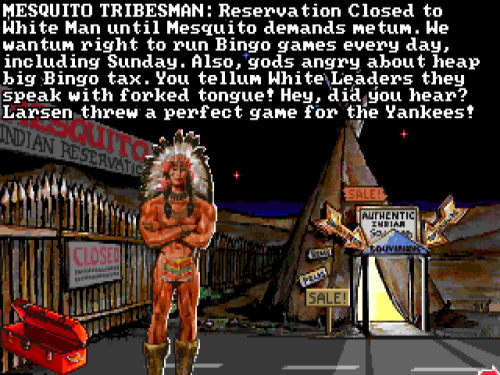|
VideoGameVet posted:
I had heard this before somewhere else also, and had originally came here to ask if it was really true, but I am always amazed to hear that Return to Zork saved Activision from bankruptcy and helped propel them to become the giant that they are now in the videogame industry, since most younger players of games published by them nowadays likely haven't heard of it or even the Zork series in general. Not sure if you would be able to elaborate on this, as I guess it would have mostly been after you left the company, but I used to have a pet theory that the original concept for Zork Nemesis was not going to be a Zork game at all, but it later became one to capitalize on brand recognition and added a bunch of references to earlier Zork games that sort of clash with its attempt at a mostly deadly serious tone.
|
|
|
|

|
| # ? Apr 19, 2024 22:56 |
|
Earwicker posted:man i loving loved this game as a kid. i was terrible at it, always crashing freighters when i tried to park them and just making really bad business decisions from the getgo but hey, i was like 8 and i found it a more enjoyable way of "seeing the world" than carmen sandiego anyway. never made it to a point where i got to play with the nicer ships I’d vote for daikatana mainly because it inspired the designer character in “Grandma’s Boy.” But Star Citizen just amazes me with the level of fail. But then again I worked on LGOP2 Yeah. ET too VideoGameVet fucked around with this message at 02:17 on May 7, 2021 |
|
|
|
Killswitch posted:Did you ever work on Little Big Adventure or Twinsens Odyssey? I vaguely recall those being activision titles in the 90s as a kid and I played the poo poo out of those two. Were they Activision? I don’t think so.
|
|
|
|
Item Getter posted:I had heard this before somewhere else also, and had originally came here to ask if it was really true, but I am always amazed to hear that Return to Zork saved Activision from bankruptcy and helped propel them to become the giant that they are now in the videogame industry, since most younger players of games published by them nowadays likely haven't heard of it or even the Zork series in general. RTZ and Mech Warrior 2 mainly.
|
|
|
|
Killswitch posted:Did you ever work on Little Big Adventure or Twinsens Odyssey? I vaguely recall those being activision titles in the 90s as a kid and I played the poo poo out of those two. Little Big Adventure 2 is a 1997 adventure game developed by Adeline Software International and published by Electronic Arts. It was later re-released by Activision in June 1997 in North America under the name Twinsen's Odyssey. That's after I left.
|
|
|
|
VideoGameVet posted:Little Big Adventure 2 is a 1997 adventure game developed by Adeline Software International and published by Electronic Arts. It was later re-released by Activision in June 1997 in North America under the name Twinsen's Odyssey. That's after I left. Ahh thanks. So how does this even work if one company published it, but then another publisher re-releases it under a new title? Are they just buying the rights? What makes a decision like that reasonable? I got Twinsen’s Odyssey as one of probably a dozen CDs when my dad bought a soundblaster card, are they even making money on something like that?
|
|
|
|
Killswitch posted:Ahh thanks. So how does this even work if one company published it, but then another publisher re-releases it under a new title? Are they just buying the rights? What makes a decision like that reasonable? Every contract can be structured differently, but I'd expect a typical setup for a deal like that would involve a lump-sum payment to the Euro publisher, in exchange for the right to publish here and keep the profits from NA sales. Both sides would expect to profit from this deal: EA gets a predefined amount money at 0 risk or additional expense to them, and Activision has to expend marketing and possibly localization and a new production run, but hopes to sell enough to break even. In fact, despite being huge hits in Europe, the Twinsen games sold terribly in the US (the creator blamed this on bad marketing which emphasized combat when that wasn't really the point of the games), so EA probably won out in that deal. The real question is the developer, and that's where a lot of variation lies. Maybe they only got milestone payments from the publisher and no royalties; maybe they only get royalties from Euro sales but not third-party sales elsewhere; maybe they get royalties from sales anywhere; it totally depends on what's laid out in their contract with EA.
|
|
|
|
Killswitch posted:Ahh thanks. So how does this even work if one company published it, but then another publisher re-releases it under a new title? Are they just buying the rights? What makes a decision like that reasonable? Activision did a deal like that with a special MPEG version of The Return To Zork for the ReelMagic MPEG card. It represented a decent amount of cash. That version is by far the best one.
|
|
|
|
mercenarynuker posted:Don't forget the saga of Duke Nukem Forever, which I have played and beaten for some insane reason It was funny how little fanfare it was released to. It went from being this hotly anticipated game, to a legendary sort of thing, to just a joke, and finally just "oh did that get released?"
|
|
|
|
Dr_Amazing posted:It was funny how little fanfare it was released to. It went from being this hotly anticipated game, to a legendary sort of thing, to just a joke, and finally just "oh did that get released?" So late that people just didn't care I guess?
|
|
|
|
I am a full stack web developer, and I've always wondering how game developments works compared to web dev. 1) How is tooling for game development? Context: Up until like mid 2010 web dev didn't have the ability to easily do a lot of stuff you see on the web today. Around that time some tools launched which made being able to quickly and easily build complex stuff. Now we constantly have new open source tools and software to make life easier for us. These tools typically drastically reduce the amount of code we have to write, or automate a tedious process to reduce the amount of time we spend writing code. What kind of coding tools do you guys use to make game dev life easier? 2) Has developing games become easier over time? Context: As mentioned above, web development has become really easy to the point that you can do a lot of stuff that wasn't easy before. Games seem like they get more difficult over time because of all the new features. Is it more difficult to make games now then before? Or has it become easier as time goes on? 3) What was version control like when you started? Did you use git? 4) How was troubleshooting code done before things like stack overflow and google? It seems like you did a majority of your coding before people had the ability to google answers to programming questions. What was that like? 5) What were the IDEs like? Nowadays we have so many IDEs with features like intellisense and a lot of plugins that make our quality of life easier. What did you have before? Was it basically just like using notepad?
|
|
|
|
UtahIsNotAState posted:I am a full stack web developer, and I've always wondering how game developments works compared to web dev. I’ve been in the industry for a long time so let me break this into some sort of history. My console experience is mainly SNES and Genesis from a “tools’ perspective, so this will mainly be about PC and Mobile: 1970’s to 1984: BASIC, Assembly. There was a Pascal (P-System) which compiled to some sort of virtual machine. Avalon Hill’s text adventure game “Lords Of Karma” (I was a playtester) used the Pascal. I also started coding in FORTH, did a Turtle-Graphics thing for The Atari Program Exchange (APX) and Valgraphics and a wire-frame 3D thing for ValForth (nothing to do with Valdocs, just a coincidence that I ended up working on that). My AH games were Basic and Assembly (when needed). One exception to this was Infocom. They used a Mainframe LISP to code their text adventures in a LISP like language. A really high level system. Source control? Not much. No GIT. 1984-1988 Mac, IBM PC. Mac used a LISA and Pascal for dev. I ended up using a FORTH for my 2 Mac games (Pyramid of Peril and MacChallenger), You started to have descent ‘C’s and Pascals (Turbo C and Turbo Pascal were really popular). Most of the games with real time play were all or mostly assembly. C64? NES? Assembly for the most part. 1988 to 1994 My time at Activision. We did stuff like version control with servers on the LAN. The adventure game companies (Sierra, Lucas, Infocom) had decent dev systems. I created MADE originally to port Cyan’s “The Manhole” to DOS. Consoles? All assembly of course. The original SNES dev. System was a SONY NEWS Unix workstation. Starting to see decent 3D modeling tools. 1994 - Now Development tools vastly improve. Hardware 3D on PC’s. Windows gets support for fast 2D and 3D graphics. Internet. Source repository. IDE’s like Unity and Unreal are super impressive. Mobile starts with crappy feature phones in the 2000 decade. IPhone and Android bring app stores that creates a tsunami of games released. So while it’s easier to build a cool game, the competition is off the charts.
|
|
|
|
VideoGameVet posted:I’ve been in the industry for a long time so let me break this into some sort of history. My console experience is mainly SNES and Genesis from a “tools’ perspective, so this will mainly be about PC and Mobile: That's a really loving cool history. Thanks for that. I had some more if it's OK. 1) For web dev, it's possible to get a good job as a self taught dev (outside of some snobby companies). What's that like for game dev? Do self taught game devs have a fair shot as someone with a CS degree? I managed to get a job as self taught at a major non tech company and was wondering if it was possible for game devs to do the same. 2) Are technical interviews any different for game devs? In web dev sometimes you'll get high end companies who want you to know all about data structures and algorithims even if you do front end code (styling the UI/UX). The more reasonable technical interviews involve API questions and quick pair programming. 3) I keep hearing about "Crunch" in game dev and I was hoping you could explain what causes it. In web dev, I think the way it works in most places is that by the time it gets to the coders hands the UI is completely mocked up, so we're just taking static files and turning them into code. No one else really has to do anything besides maybe QA and I guess whoever deploys the code. How does it work for game dev? Like, if the coders are the one who write the code, what are other people doing during crunch? I get QA is probably testing code, but what about designers and stuff? Does designing take a long time which causes the coders to scramble? 4) From what you've talked about, it seems like Game Dev is super hard. The salaries for game devs and web devs are neck and neck. Why would someone choose game dev? Like web dev all we pretty much do all day is loop through JSON objects. That seems a lot easier then what you guys have to deal with. Do game devs ever get fed up and switch to programming simpler stuff?
|
|
|
|
UtahIsNotAState posted:3) I keep hearing about "Crunch" in game dev and I was hoping you could explain what causes it. In web dev, I think the way it works in most places is that by the time it gets to the coders hands the UI is completely mocked up, so we're just taking static files and turning them into code. No one else really has to do anything besides maybe QA and I guess whoever deploys the code. How does it work for game dev? Like, if the coders are the one who write the code, what are other people doing during crunch? I get QA is probably testing code, but what about designers and stuff? Does designing take a long time which causes the coders to scramble? It's not specifically a game dev problem. It just happens there a lot because of the nature of the business. Most software projects these days use some flavor of agile methodology: you build something in a short span of time, release it, then iteratively improve it and add more features. That's not how games work. You need a complete game with all the major systems working, tuned, tested, etc before you can release it. The key behind agile is that you accept that you can't really predict what's going to happen accurately longer than a week or two in the future, so you're not committing to any deliverables longer than the next few weeks. In game dev, they announce a date: Coming in June 2023! They have no idea if it will be done by then. They can't possibly know. The date is frequently decided on without even consulting the team doing the work. But now there's a commitment that the developers, artists, testers, et al have. So now it's January 2023. The team hit a bunch of unexpected challenges. system x and y didn't really work well together, and Z was just horribly unfun and had to be scrapped. Everything's behind schedule. They won't change the release date. Then you enter crunch time.
|
|
|
|
UtahIsNotAState posted:That's a really loving cool history. Thanks for that. 1. You can be self-taught, heck there are online courses for Unity and Unreal, but as far as getting hired having a portfolio of games you've released (Indie) really helps. Game Jams are useful as well. Someone with a CS degree vs. someone who released a cool Indie game or did something great at a game jam? Portfolio tends to win. 2. Interviews are all over the map. Depends on the company. I've interviewed for Director of Tech work and never got asked a CS question. 3. The other reply did a great job of explaining Crunch. Do all games end up like that? No. But I'm pretty sure the current AAA stuff does. Some companies operate in continual crunch. It can be a very unhealthy lifestyle. I was putting in the hours at Activision and was a mess physically. Well over 300lbs etc. Went to an educational software company that had normal hours. Started bike commuting. Dropped over 140 lbs in 1996. That company didn't have crunch because it was building curriculum based games and we had a very tight production process. Games were not fancy, but they met the objective. 100+ CD's for the PlayStation and Windows.
|
|
|
|
The complexity and diversity and interreliance of tasks involved in game development, especially at the upper end of scale, are some of the most difficult to manage things out there. At the same time, the industry doesn't select for the most skilled management due to employment instability, relative compensation rates, a tendency to hire from within field or up from below, and all sorts of weird, toxic, unprofessional practices and beliefs by both industry and consumer actors.
|
|
|
|
Discendo Vox posted:The complexity and diversity and interreliance of tasks involved in game development, especially at the upper end of scale, are some of the most difficult to manage things out there. At the same time, the industry doesn't select for the most skilled management due to employment instability, relative compensation rates, a tendency to hire from within field or up from below, and all sorts of weird, toxic, unprofessional practices and beliefs by both industry and consumer actors. I wrote a piece on this in the 1990’s. “Why Can’t Johnny Ship.” Not all of that is still relevant but stuff like real design, prototyping, scope control etc still are.
|
|
|
|
UtahIsNotAState posted:That's a really loving cool history. Thanks for that. I do software engineering in games (mostly tools) here - Vet's answer definitely track. To add bonus context: 1) Most people I work with do not have CS degrees and are self-taught. No one seems to care about your education and they really want to see your portfolio. 2) I've never had an interview that didn't ask about CS fundamentals. Especially as you approach graphics, engine and higher ranks of of gameplay engineering, the expectation is that you have a deep understanding of how a computer actually does the work it does. I was drilled pretty extensively about threading and the inner workings of an await/async pattern for a mid level tools position. I'll also say that I've never heard of a 'front end' tools developer. The expectation in my experience is that you can wield your entire stack, perhaps with a specialty or a focus. I'd imagine Gameplay for a Unity or Unreal project may ask about API stuff, but the expectation in my experience is that you could author the API if given the time, not just use it. 3) Crunch is becoming less common I think, but everyone is doing 'their thing' during crunch. If design is making more stuff, then QA has more functional and regression work to do. Art might have more requests and more bugs for other systems are likely being entered etc. etc. 4) I choose games because I like games a lot and can put a lot of energy into my craft and feel great about it -- I can care about the product I work on. Also, I love the problem space. It's frequently hard, but also untouched (at least publicly) and so I frequently get to design and craft my own solutions to problems, or invent workflows and process. If I was 'designing to a spec', I'd probably quit the job in a month. My favorite problems are one with a super abstract call to action e.g. 'The art pipeline just really sucks. Make it better please.'
|
|
|
|
Canine Blues Arooo posted:I do software engineering in games (mostly tools) here - Vet's answer definitely track. To add bonus context:
|
|
|
|
Vegetable posted:I have trouble reconciling these two points — none of your coworkers are trained in CS yet the job demands a strong understanding of CA fundamentals? Is the implication here that all the self-taught people have managed to grasp strong fundamentals? Not exactly impossible if you only hire the self-taught people who have managed to teach themselves those fundamentals.
|
|
|
|
Vegetable posted:I have trouble reconciling these two points — none of your coworkers are trained in CS yet the job demands a strong understanding of CA fundamentals? Is the implication here that all the self-taught people have managed to grasp strong fundamentals? They do respect CS background, but the portfolio is more important.
|
|
|
|
What was your take when things like Steam Sales and the Humble Bundle and such seemed to massively tank the price of games people were paying for? From what I've heard, while these deals were a huge financial success for a number of parties (Valve, well-known indies, publishers going through steam, etc.) it's had some long-term repercussions about what people are willing to pay for games and has possibly made it harder for some studios to charge enough to be sustainable.
|
|
|
|
Vegetable posted:I have trouble reconciling these two points — none of your coworkers are trained in CS yet the job demands a strong understanding of CA fundamentals? Is the implication here that all the self-taught people have managed to grasp strong fundamentals? You can get sufficient CS fundamentals for most jobs in the industry by studying interview books specifically geared toward bootstrapping that kind of knowledge (such as Cracking the Coding Interview). Meanwhile, strong CS fundamentals aren't necessarily a prerequisite for a lot of jobs in the broader software development industry. I have a BS in CS, have worked as a developer and consultant for almost 20 years, and I've forgotten 90% of what I learned in college because it hasn't really come up that frequently in my career. I'd likely have to study those books just as much as someone without a CS background if I wanted to get a job at a FAANG company. In interviews, it's mostly about being able to look at a problem, broadly group it into a category with well-known efficient solutions, and then talk about or implement that efficient solution on the fly.
|
|
|
|
Manyorcas posted:What was your take when things like Steam Sales and the Humble Bundle and such seemed to massively tank the price of games people were paying for? From what I've heard, while these deals were a huge financial success for a number of parties (Valve, well-known indies, publishers going through steam, etc.) it's had some long-term repercussions about what people are willing to pay for games and has possibly made it harder for some studios to charge enough to be sustainable. That's a minor thing compared to the absolute domination of the "Free To Play" (F2P) model in Mobile. It's changed casual games forever and I suspect it will become the dominant model on PC/Mac as well. Not sure that's a good thing. I'm helping the folks who do "Gem Rush" and it's maddening to see this quality of work fight that trend (it's a premium game).
|
|
|
|
Regarding advanced degrees ... My undergrad was physics and astronomy, but when I started to do games as an independent at Avalon Hill, I transferred into UNH for a joint program in computer engineering and astrophysics. The course I took in digital signal processing would play a major role in my work on image/video/audio compression stuff and the 1-bit DAC patent. I also took grad courses in AI and Graphics. That mattered as well.
|
|
|
|
Vegetable posted:I have trouble reconciling these two points — none of your coworkers are trained in CS yet the job demands a strong understanding of CA fundamentals? Is the implication here that all the self-taught people have managed to grasp strong fundamentals? Echoing again what VGV said: Portfolio is generally king here, and strong portfolios frequently demonstrate strong CS fundamentals. I'm in the camp of 'self taught', but I know at least my domain pretty well. A lot of it is borne from improving in steps. I discovered Big O notation after someone criticized the run time of a solution I posted and recommended I look into it. I learned a lot about the aforementioned threading problems as I wanted to understand how to better use the 16+ cores on the super computers that are modern desktops (and also understand how to not lock the UI thread...). Honestly, all of that was helpful, but nothing helped quite as much as trying to seriously engage with C. If you take the time to learn C, you will also learn a lot about memory, pointers, and data structures as the language demands you are more intimate with those ideas than the crop of higher level languages we have today.
|
|
|
|
Manyorcas posted:What was your take when things like Steam Sales and the Humble Bundle and such seemed to massively tank the price of games people were paying for? From what I've heard, while these deals were a huge financial success for a number of parties (Valve, well-known indies, publishers going through steam, etc.) it's had some long-term repercussions about what people are willing to pay for games and has possibly made it harder for some studios to charge enough to be sustainable. Marketing games is super-hard and free to play has changed the landscape forever. I have a friend who's company published a Steam/Mobile version of a well liked board game (that went out of production, the paper game that is) and they struggle for sales. Sometimes you have to do a sale to get any volume or in the case of multiplayer, simply get players into the game.
|
|
|
|
It seems almost like the Movies vs TV problem
|
|
|
|
shame on an IGA posted:It seems almost like the Movies vs TV problem Yeah, ad supported TV vs. premium Movies. But Free To Play is a whole new way of extracting cash from the Obsessive Compulsives. There are fair Free To Play models, and then there are Skinner Boxes.
|
|
|
|
VideoGameVet posted:Yeah, ad supported TV vs. premium Movies. I am in the midst of dealing with a Personal Issue w/r/t the power creep market present in most phone games, and without getting too personal here, I'm pretty sure those exploitative pieces of poo poo are fuckin' Divorce Machines. Good thing there's a kid involved so I wasn't willing to go that far, right? 
|
|
|
|
Zarin posted:I am in the midst of dealing with a Personal Issue w/r/t the power creep market present in most phone games, and without getting too personal here, I'm pretty sure those exploitative pieces of poo poo are fuckin' Divorce Machines. One of the “candy games,” I’m guessing. My wife loved the word game I designed, but when that went off market she switched to Ruzzle... with it’s unintelligible scoring system. But at least it’s ad supported. The game I designed was also ad supported and you could pay $1.99 and turn that off. The “candy games” use a game mechanic that focuses on compulsive players for revenue, with the expected results. I was quoted on Activision’s acquisition of King by Pocket Gamer. What I said that besides the obvious reason for it (profitable company) I said that when the consoles move to digital distribution, Free2Play will eventually become the dominant model. King has psychologists on staff who understand addictive behavors. I wish Apple had set the base price at 99¢ and not 0. Free2Play so dominates mobile now and I think it will start to do the same on consoles.
|
|
|
|
Idle clickers are the purest expression of what gaming actually is and playing one will either cure you of video games forever or leave you unable to enjoy anything else. Crack: Try it once at least it'll make other drugs not fun anymore
|
|
|
|
VideoGameVet posted:Free2Play so dominates mobile now and I think it will start to do the same on consoles. I sincerely hope you are wrong, but I'm willing to bet that you are right.
|
|
|
|
VideoGameVet posted:My Faux Pas was LGOP2. Did the game engine and UI for that. But that lead to The Return To Zork. Woof, I get what this is trying to do but it's still so racist  Did you have any input into the content?
|
|
|
|
kimbo305 posted:Woof, I get what this is trying to do but it's still so racist I didn't write it. Just did the UI and Engine. That was Steve Meretzky's writing, supposed to be a satire of 1950's movies. https://en.wikipedia.org/wiki/Leather_Goddesses_of_Phobos_2:_Gas_Pump_Girls_Meet_the_Pulsating_Inconvenience_from_Planet_X!
|
|
|
|
I got sick and tired of the "age thing" being an issue, so yesterday I biked to a meeting about fixing the marketing on a mobile game. That seems to have solved it. This company has a word game with hundreds of downloads, similar in quality and play to one with over 10m downloads ... partly because they didn't do decent screenshots, ASO, etc. Hopefully I can negotiate a consult and then get myself to be their CMO/CCO.
|
|
|
|
I was asked how I messed up in the NFT thread Here’s how: I left the VP slot at Activision in '94 to do educational games at Lightspan. Timing is everything, we IPO'd one month before the 2000 tech crash. I did a lot in mobile in the next two decades but like I said, not many game companies want to hire 60+ year old people. Hell, when I was 50 I had several interviews to run a Seattle Studio (2007) and was flown up with my future wife and was told to find a place to live. Offer withdrawn the following Monday. I came very close to nailing a technical director position 2 weeks ago at a major card/mobile game company, but just missed the cut (3 weeks with 4 interviews). Liked the company, liked the people. Two weeks ago I had a consulting interview to fix the marketing for a mobile word game co, so I biked the 46 mile round trip for precisely this reason (not a big deal for me, but it did impress). So yeah, I'm a dumbass for leaving Activision in 1994, but I was also over 350lbs and going to Lightspan took me back to a 40 hour week and I dropped about 140lbs of weight in 1996. Had I stayed at Activision, with the endless crunch, I don't know if I would have done that. I might not even be around. As to the NFT stuff one of my Aegis (Amiga) co-workers from the 1980's has a piece of digital art of historic significance and I'd like to see him get some money from it.
|
|
|
|
I wouldn't be surprised if there was serious (and possibly illegal, but impossible to enforce) bias against hiring older age employees in the game industry if you don't already have connections to get somewhere higher in the company. The industry seems to thrive on taking in highly-motivated but naive fresh grads, extracting what they can from them until they burn out, and spitting them out into another industry. Harder to do that with someone with more experience.
|
|
|
|
Manyorcas posted:I wouldn't be surprised if there was serious (and possibly illegal, but impossible to enforce) bias against hiring older age employees in the game industry if you don't already have connections to get somewhere higher in the company. The industry seems to thrive on taking in highly-motivated but naive fresh grads, extracting what they can from them until they burn out, and spitting them out into another industry. Harder to do that with someone with more experience. There is an age bias in the software development industry as a whole. There are a lot of companies that like to see "passionate" developers that work on personal projects in their spare time. People who do that are almost universally young, single, and childless, because you have less time to gently caress around on the computer when you have a family and responsibilities. Once you hit 40 or so, there's a lot of "bad culture fit", and it gets worse as you get older.
|
|
|
|

|
| # ? Apr 19, 2024 22:56 |
|
New Yorp New Yorp posted:There is an age bias in the software development industry as a whole. There are a lot of companies that like to see "passionate" developers that work on personal projects in their spare time. People who do that are almost universally young, single, and childless, because you have less time to gently caress around on the computer when you have a family and responsibilities. Once you hit 40 or so, there's a lot of "bad culture fit", and it gets worse as you get older. One factor in my getting hired last August was the "personal project" I did in 2019, The Climate Trail. Yes, it was a bizarre company that never kicked off the project I was hired for, but I did feel like I did some good there in turning around the game publishing division and getting stuff out. I'm hopeful that with that project and my accomplishment at Lightspan (big ed-tech company) I might land a job in educational games. And as I have mentioned, physically I'm in better condition than most of the people in the business.
|
|
|




















